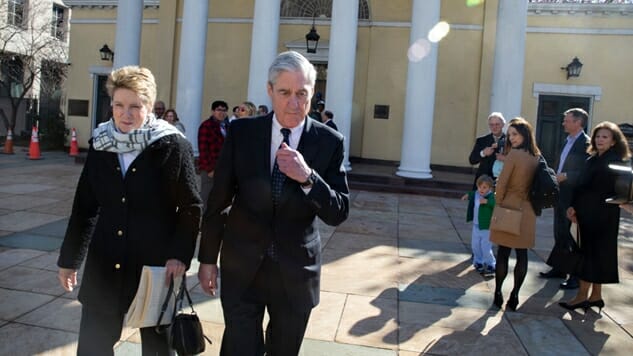Robert Mueller Put Trump’s Fate in Congress’s Hands
Photo by Tasos Katopodis/Getty
Lost in all the gloating over how the Mueller report did or did not vindicate various people’s positions is the fact that we are not done with this. Lots of people have treated Mueller’s filing as the endpoint of this mess, but that is a misreading of Mueller’s mandate. The Washington Post reported that he views his job as investigatory, not prosecutorial—meaning that Mueller planned to dig as much stuff up as possible without sticking around to see how the legal process plays out. Per The Daily Beast:
A source with direct knowledge of the investigation told The Daily Beast that it was their interpretation that “Mueller was making a case to Congress, who (unlike DOJ, in Mueller’s view) is empowered to weigh the lawfulness of a president’s conduct.”
This reporting lines up with the summary of Mueller’s report written by Attorney General Bill Barr and Deputy Attorney General Rod Rosenstein. Per the DOJ:
The Special Counsel therefore did not draw a conclusion — one way or the other — as to whether the examined conduct constituted obstruction. Instead, for each of the relevant actions investigated, the report sets out evidence on both sides of the question and leaves unresolved what the Special Counsel views as “difficult issues” of law and fact concerning whether the President’s actions and intent could be viewed as obstruction. The Special Counsel states that “while this report does not conclude that the President committed a crime, it also does not exonerate him.”
Now it’s difficult to pin down exactly what Robert Mueller is talking about here. The “difficult issues of law” could be referring to the only legal guidance we have on the topic, a Department of Justice memo stating that “The indictment or criminal prosecution of a sitting President would unconstitutionally undermine the capacity of the executive branch to perform its constitutionally assigned functions.”
Mueller could also be talking about the constitutional aspect to this, where impeachment is a political question for the Congress, not a legal question for the Department of Justice. It’s hard to say exactly what this means without reading the full Mueller report, which is why it’s so important that this report be made as public as possible (it no doubt includes a ton of classified information, which is why it should take some time to release the information contained in the report). Not to mention, two Trump appointees in the DOJ saying that they “concluded that the evidence developed during the Special Counsel’s investigation is not sufficient to establish that the President committed an obstruction-of-justice offense,”—and not Robert Mueller—is not great optics for the DOJ. We need to see this report.
One thing that is pretty clear from this report however, is Mueller’s statement that “the investigation did not establish that members of the Trump Campaign conspired or coordinated with the Russian government in its election interference activities.” The MSNBC-backed notion that Trump is Putin’s puppet and he is under the sway of the Russian strongman’s every whim is betrayed by the words of Robert Mueller. This is an angle that liberals are going to need to drop to some degree, as even though a judge said that Paul Manafort handing off sensitive campaign polling data to his Russian military intelligence-trained right hand man, Konstantin Kilimnik, constituted a connection to the Russian government, Robert Mueller seemingly concluded that actions like those do not meet the high legal bar his work requires. The Mueller saga is far from over, as the obstruction of justice question was left wide open-ended, and per The Daily Beast report and reading between the lines in the DOJ’s summary of Mueller’s report, the determination of whether the president obstructed his investigation will surely be left up to Congress.
Jacob Weindling is a staff writer for Paste politics. Follow him on Twitter at @Jakeweindling.







































